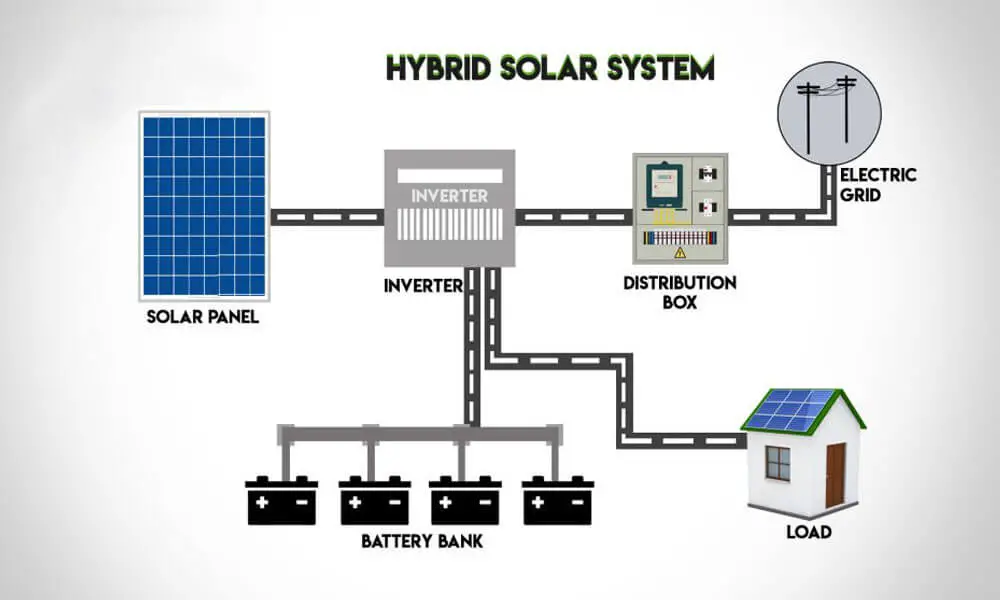As solar energy adoption grows, many homeowners and businesses are seeking solutions that offer both efficiency and reliability. Enter the hybrid solar system—a versatile setup that combines the benefits of both on-grid and off-grid systems. In this blog, we’ll explore what hybrid systems are, how they work, their benefits, challenges, and who can benefit most from them.

What is a Hybrid Solar System?
A hybrid solar system is a setup that integrates solar panels, battery storage, and a grid connection. This system allows you to generate electricity, store excess power in batteries, and draw from the grid when needed. It provides the flexibility of grid-tied systems while ensuring backup power during outages like an off-grid system.
Essentially, a hybrid system allows you to:
- Use solar power during the day.
- Store excess energy in batteries for use at night or during low-sunlight periods.
- Draw power from the grid if battery reserves are low.
- Sell excess power back to the grid (where net metering is available).
Components of a Hybrid Solar System
- Solar Panels: Generate electricity from sunlight.
- Hybrid Inverter: Converts direct current (DC) from panels and batteries to alternating current (AC) for home use and manages power flow.
- Battery Bank: Stores excess electricity for later use.
- Grid Connection: Provides a backup power source when solar and battery reserves are depleted.
How Does a Hybrid Solar System Work?
Daytime Solar Generation:
- Solar panels generate electricity, powering your home or business directly.
- Any excess energy is used to charge the batteries.
Battery Storage:
- When solar production exceeds demand, the surplus energy is stored in the battery bank.
Evening and Nighttime Use:
- When the sun goes down, stored energy from the batteries powers your home.
Grid Backup:
- If battery reserves are depleted, the system seamlessly switches to the grid to ensure continuous power.
Sell Excess Power:
- In regions with net metering, you can send excess power to the grid and receive credits on your electricity bill.
Benefits of a Hybrid Solar System
✅ Backup Power During Outages:
- Unlike on-grid systems, hybrid systems ensure you have electricity during power cuts by using stored battery power.
✅ Optimized Energy Usage:
- Store excess solar power for later use, reducing reliance on the grid and saving on electricity bills.
✅ Energy Independence:
- Provides more control over your power usage, reducing vulnerability to grid failures or energy price hikes.
✅ Reduced Energy Costs:
- By using stored solar energy during peak times (when electricity rates are higher), you can minimize your electricity costs.
✅ Environmental Benefits:
- Reduces your carbon footprint by maximizing the use of clean, renewable energy.
✅ Flexibility and Scalability:
- Hybrid systems can be easily expanded with more solar panels or battery capacity as your energy needs grow.
Challenges of Hybrid Solar Systems
❌ Higher Initial Cost:
- Batteries and hybrid inverters add to the upfront cost compared to standard on-grid systems.
❌ Maintenance Requirements:
- Batteries require periodic maintenance and may need replacement every 5-10 years.
❌ Complex Installation:
- More components mean a more complex installation process, requiring skilled professionals.
❌ Limited Battery Storage:
- The battery bank’s capacity dictates how long you can rely on stored power. Larger storage solutions can increase costs.
Who Should Choose a Hybrid Solar System?
- Homeowners Seeking Backup Power: If you experience frequent power outages and want a reliable backup, a hybrid system is ideal.
- Businesses with Critical Power Needs: For businesses where downtime is costly, hybrid systems ensure continuous power supply.
- Energy-Conscious Users: If you want to maximize solar energy usage and reduce reliance on the grid, a hybrid system is a smart choice.
- Locations with Net Metering: Where net metering policies are available, you can benefit by selling excess energy back to the grid.
Hybrid System vs. Other Solar Systems
- On-Grid System: More affordable but doesn’t provide backup power during outages.
- Off-Grid System: Offers complete independence but requires large battery storage and higher costs.
- Hybrid System: Balances cost, reliability, and flexibility by combining the strengths of both on-grid and off-grid systems.
Conclusion
A hybrid solar system offers the perfect blend of efficiency, reliability, and flexibility. Whether you want to reduce your electricity bills, ensure backup power, or minimize your carbon footprint, a hybrid system can meet your needs. Though the initial investment is higher, the long-term benefits of energy savings, independence, and security make it a worthwhile choice.
Ready to explore hybrid solar solutions? At Thangam Energy Solutions, we provide expert consultation, design, and installation services for hybrid solar systems tailored to your needs. 🌱⚡
Contact us today and take the first step toward reliable, efficient solar energy! ☀️🔋
